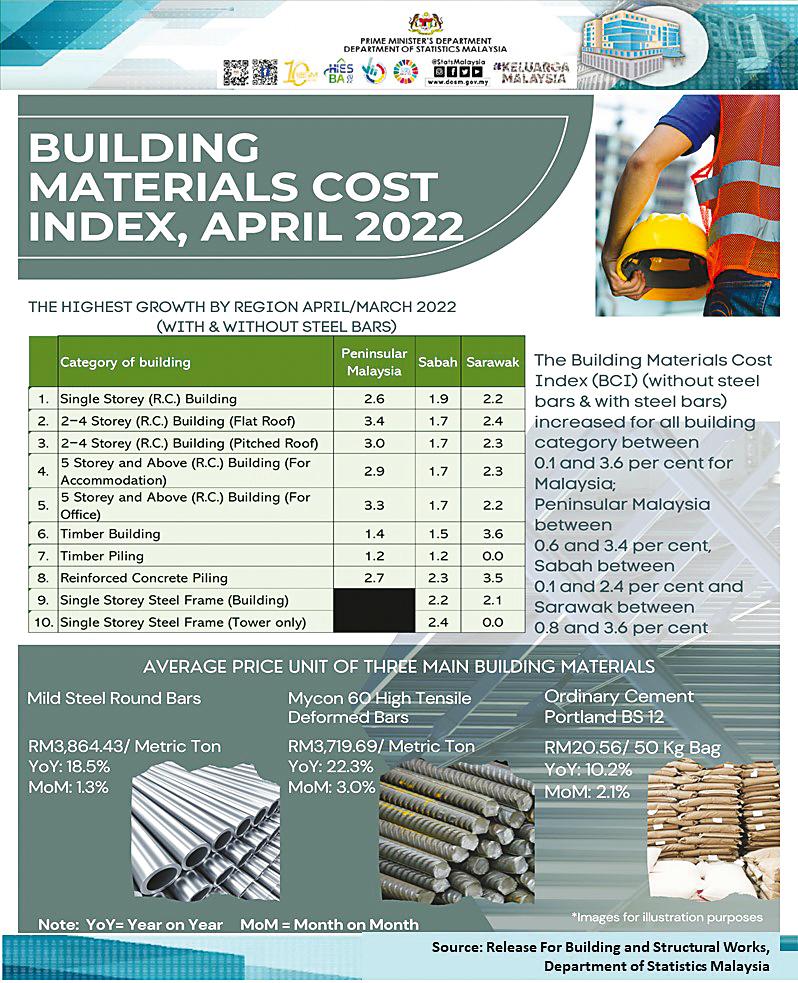PETALING JAYA: The Building Materials Cost Index (BCI) (without steel bars & with steel bars) increased for all building category between 0.1 and 3.6% for Malaysia; Peninsular Malaysia between 0.6 and 3.4%, Sabah between 0.1 and 2.4% and Sarawak between 0.8 and 3.6%, according to the Statistics Department.
Chief statistician Malaysia Datuk Seri Dr Mohd Uzir Mahidin said the BCI without steel bars for all region in Peninsular Malaysia increased between 0.9 and 3.4% for almost all building categories.
“Building categories that recorded the highest increase was 2−4 storey reinforced concrete (RC) building (flat roof) in Terengganu and Kelantan. The BCI without steel bars in Sabah and Sarawak increased between 0.3 and 3.6% for almost all categories of building,“ he said in a statement today.
Building categories with the highest increase in Sabah and Sarawak were single storey steel frame (tower only) in Kota Kinabalu and timber building in Kuching.
The BCI with steel bars for all region in Peninsular Malaysia, Sabah and Sarawak increased between 0.1% and 3.6% for almost all building categories. Building categories that recorded the highest increase in Peninsular Malaysia was 2−4 storey (RC) building (flat roof) and five-storey and above (RC) building (for office) in Penang, Kedah, Perlis, Terengganu and Kelantan with 3.1%, Kota Kinabalu (Sabah) with 2.4% for single storey steel frame (tower only) and timber building in Kuching (Sarawak) with 3.6%.
Uzir explained that the unit price index for steel which consists of mild steel round bars and mycon 60 high tensile deformed bars increased 2.3% as compared to 1.4% in the previous month. The highest increase in steel was recorded in Sarawak (3.8%) and followed by Kelantan, Terengganu and Pahang with 2.4%.
Uzir further added that almost all building materials such as cement, steel, aggregates, sand, bricks & wall, roofing materials and ceiling materials increased in April 2022. Report by World Steel Association stated that the world crude steel production for 64 countries was 161 million tonnes in March 2022, a 5.8% decrease as compared to March 2021.
Global crude steel production was 456.6 million tonnes in the first three months of 2022, a decline of 6.8% as compared to the same period in 2021. Asia and Oceania produced 331.3 million tonnes of crude steel in the first quarter of 2022, a decrease of 7.8% on the first quarter of 2021.
According to a report by World Bank, most commodity prices are expected to increase in 2022 and remain high in the medium term, particularly for commodities where Russia and Ukraine are key exporters, including energy and some grains. Commodity prices rose sharply following the start of the war in Ukraine, adding to the broader post Covid-19 rally. The increase in energy prices will drive up cost of extracting and refining metal ores, particularly aluminium, iron ore and steel.
Meanwhile, the value of construction work done in the first quarter 2022 amounted to RM29.5 billion compared with RM27.6 billion in Q4’21.
For the first quarter of 2022, special trades activities subsector continued a growth of 24.1% whereas the non-residential buildings subsector recorded an increase of 4.2% in the value of construction work done. Meanwhile, the growth of residential buildings and civil engineering contracted by 11.9% and 15.5% respectively (Q4 2021: -18.2% and -20.3%).
In the first quarter of 2022, the civil engineering subsector remained dominant as the main contributor to the value of construction work done with 35.1% share. Non-residential buildings subsector contributed 30.4% while residential buildings and special trades activities contributed 24.2% and 10.2% respectively.
The share of value of construction work done were dominated by three states namely Selangor, Wilayah Persekutuan and Sarawak, totaling RM16 billion or 54.2% share. Selangor recorded the highest value of construction work done in the first quarter 2022 with RM6.9 billion. This was followed by Wilayah Persekutuan (RM5.8 billion) dan Sarawak (RM3.3 billion).









